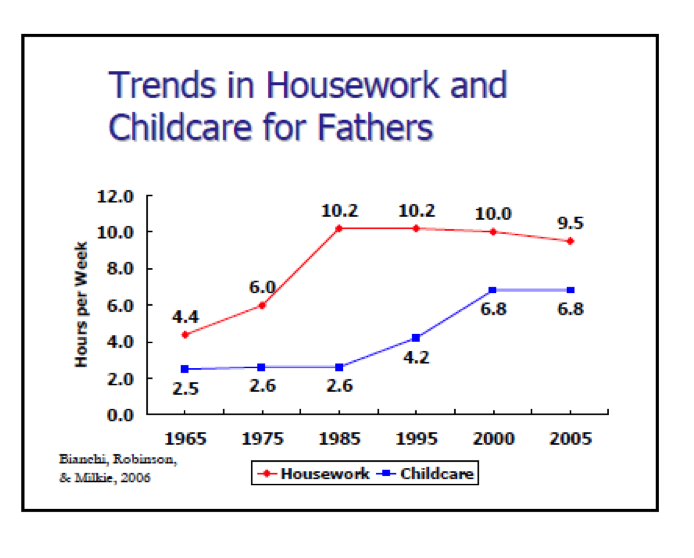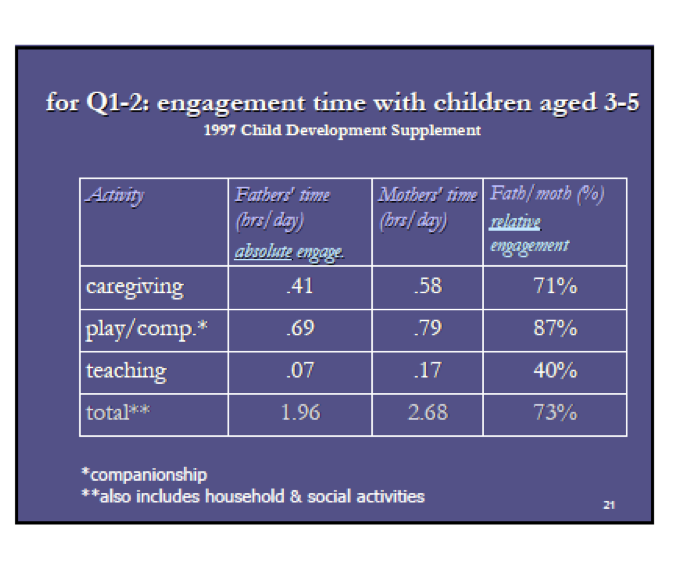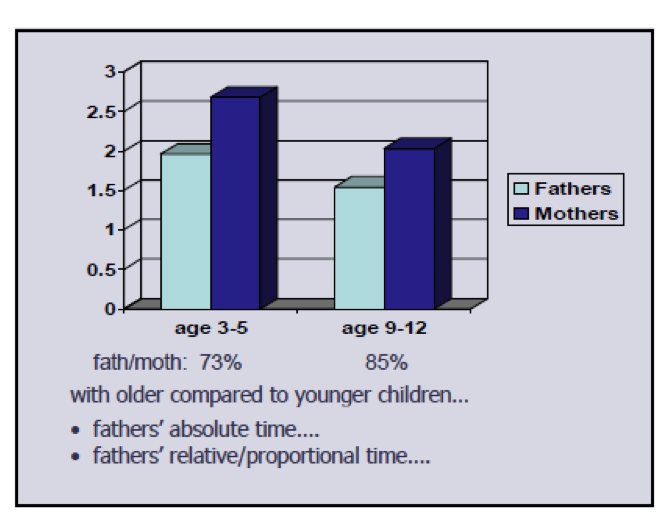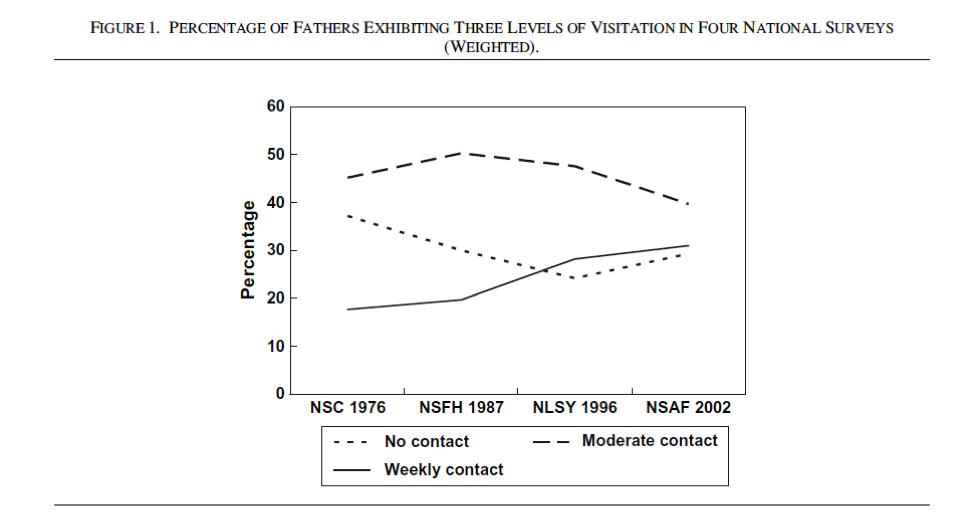Archivist and Principle Researcher, Children’s Rights Council of Illinois
I recently attended a session of the Illinois Family Law Study Committee where they discussed reforms to the statues regarding parenting time for the non-residential parent.
When the issue of increasing non-residential parenting time was proposed pundits against the idea said that it was not in keeping with current societal norms.
The person most emphatic about this said that there is a significant discrepancy in direct childcare between fathers and mothers. Most fathers would not know what to do if given more time with their children.
I am amazed at the misinformation that is circulated.
I do understand that popular beliefs are most resistant to change even in the face of contradictory facts. But it is incumbent on those policy makers who will impact our society to know the facts.
Current research has revealed significant changes in the relative involvement of fathers and mothers in direct childcare. This research on family trends sees men’s involvement in direct childcare steadily increasing over the last two decades.
Take a look at the results of the research:



These graphs were taken from a presentation given by Prof. Joseph Pleck reviewing the time diary research of Suzanne Bianchi. (Also see Sullivan, Gurion and Coltrane).
In the Michigan study shown above, father to mother relative engagement in childcare was 73% for children ages 3-5 and 85% for children 9-12. Time diary research shows that paternal involvement is not abating but even increasing, especially among two-income families. There is a growing gender convergence in childcare.
Good news. But I am worried and not necessarily because of the misinformation that is circulated.
An article co-authored by Amato, Emery and Meyers piqued my attention: “Changes in Nonresident Father-Child Contact From 1976 to 2002” Family Relations 58 (February 2009): 41–53. In studying one of the graphs presented in the paper of data taken from large national surveys, I noticed that paternal disengagement is on the rise after decades of improvement. 
The question before us is why? Is it because non-custodial fathers simply don’t care or love their children? Are there too many fathers with behavioral defects?
This is puzzling if you consider the current research on family trends mentioned above.
I believe precisely because men have increased their involvement with their children that we see a rise in their disengagement post-divorce.
It used to be with traditional minimal direct caretaking of the father in the intact family divorce provided the opportunity for dads to be involved in ways never presented before -even with the standard alternating weekend visitation schedule.
Today, that simply doesn’t cut it anymore. This is reflected in both the frustration and disappointment experienced by divorced dads and the children affected by the loss of a significant attachment. Disengagement is simply the natural outcome. I believe the work of Kruk and Greif, among others, is instructive in this regard.
They found an inverse relationship – the more the father was involved with child during marriage, the less likely to remain involved post-divorce. (Read Kruk’s article on custody and his most recent article on the effects of divorce on fathers.) Solangel Maldonado’s “Beyond Economic Fatherhood” puts it succinctly making reference to their work:
Although counterintuitive, at least one study reveals that those fathers who were most involved in their children’s upbringing during the marriage are among those who are most likely to have little or no contact with their children after divorce. These formerly involved fathers apparently cope with the pain of not living with their children and not being able to parent them on a daily basis by withdrawing or focusing their energies elsewhere.
It does seem clear to me that changing roles have made for a lot more conflict as both parents fight over time since dads who were highly involved during marriage will not accept standard access schedules that are normally awarded. Conflict naturally increases.
Bottom Line: With changes in family dynamics without any corresponding changes in how divorce is handled we will continue to see a rise in parental conflict ultimately resulting in paternal disengagement.
Do you agree with me how this can become a public health issue? This is why I am concerned and see the urgency for reform.
What do you think?
 My name is Robert Ferrer. I am a researcher and archivist at the University of Illinois Urbana-Champaign. Although it is in Computer Science, I also apply the same heuristic principles in my interests in child development and family law. As such I’ve been working with the Children’s Rights Council of Illinois and Illinois Fathers in providing the background information in law and child development research for various endeavors. I have been collecting, reading and pondering the wealth of information dealing with divorce and children from many perspectives, including child development, family studies and law.
My name is Robert Ferrer. I am a researcher and archivist at the University of Illinois Urbana-Champaign. Although it is in Computer Science, I also apply the same heuristic principles in my interests in child development and family law. As such I’ve been working with the Children’s Rights Council of Illinois and Illinois Fathers in providing the background information in law and child development research for various endeavors. I have been collecting, reading and pondering the wealth of information dealing with divorce and children from many perspectives, including child development, family studies and law.
I’ve been attending the sessions of the Illinois Family Law Study Committee where they are currently reviewing current statutes for massive revisions. I’ve been in communications with many of its members and have established a collegial relationship. I have attended conferences on Contemporary Families, PAS and ADR. I have written several proposals in the attempt to mitigate parental loss, more fully integrating current research with proposed policy.


Engineer
Robert, Thanks for the putting out this EXTREMELY good information. Couldn’t agree with you more.
I can’t even comprehend how a statement such as “Most fathers would not know what to do if given more time with their children ” can be taken into consideration by policy makers. Appalling !
Fit, able and caring fathers go out of their way, put careers on hold and give up a lot to be with their children.
[b]Policies based on misinformed information ultimately hurts children in every aspect.[/b]